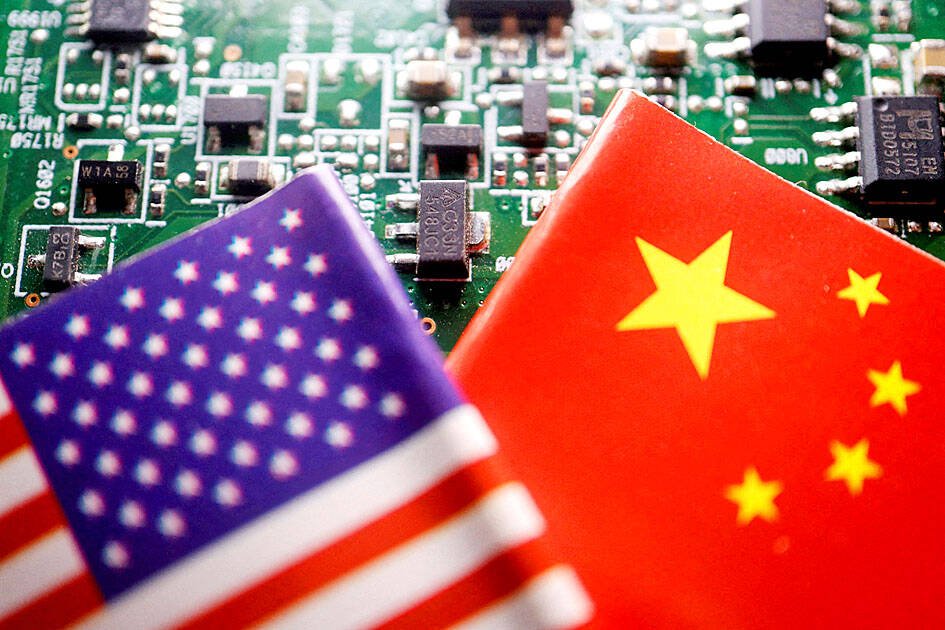US President Joe Biden’s administration is considering further restrictions on China’s access to chip technology used for artificial intelligence (AI), targeting new hardware that is only now making its way into the market, people familiar with the matter said.
The measures being discussed would limit China’s ability to use a cutting-edge chip architecture known as gate all-around (GAA), which is supposed to make semiconductors more powerful and is currently being introduced by chipmakers, the people said.
It is unclear when officials would make a final decision, the people said, adding that they are still determining the scope of a potential rule.

Photo: Reuters
The US’ goal is to make it harder for China to assemble the sophisticated computing systems needed to build and operate AI models, and to cordon off still-nascent technology before it is commercialized, they said.
Companies such as Nvidia Corp, Intel Corp and Advanced Micro Devices Inc — along with manufacturing partners Taiwan Semiconductor Manufacturing Co (台積電) and Samsung Electronics Co — are looking to start mass-producing semiconductors with the GAA design within the next year.
A spokesperson for the US Department of Commerce’s Bureau of Industry and Security, which oversees export controls, declined to comment.
The bureau recently sent a draft GAA rule to what is known as a technical advisory committee, some of the people said.
The panel is composed of industry experts and offers advice on specific technical parameters — a final step in the regulatory process.
However, the rule is not yet finalized, after industry officials criticized the first version as overly broad, the people said.
One person familiar with the matter said the measures would not go as far as an outright ban on GAA chip exports, but instead focus on the technology needed to make them.
There are also early-stage discussions about limiting exports of high-bandwidth memory (HBM) chips, some of the people said.
HBM semiconductors, made by SK Hynix Inc, Micron Technology Inc and others, speed up access to memory, helping bolster AI accelerators. They are used to train AI software — a process that involves bombarding models with information.
It is unclear whether a rule on HBM chips could come together, the people said, adding that the GAA conversation is further along.

Sweeping policy changes under US Secretary of Health and Human Services Robert F. Kennedy Jr are having a chilling effect on vaccine makers as anti-vaccine rhetoric has turned into concrete changes in inoculation schedules and recommendations, investors and executives said. The administration of US President Donald Trump has in the past year upended vaccine recommendations, with the country last month ending its longstanding guidance that all children receive inoculations against flu, hepatitis A and other diseases. The unprecedented changes have led to diminished vaccine usage, hurt the investment case for some biotechs, and created a drag that would likely dent revenues and

Macronix International Co (旺宏), the world’s biggest NOR flash memory supplier, yesterday said it would spend NT$22 billion (US$699.1 million) on capacity expansion this year to increase its production of mid-to-low-density memory chips as the world’s major memorychip suppliers are phasing out the market. The company said its planned capital expenditures are about 11 times higher than the NT$1.8 billion it spent on new facilities and equipment last year. A majority of this year’s outlay would be allocated to step up capacity of multi-level cell (MLC) NAND flash memory chips, which are used in embedded multimedia cards (eMMC), a managed

CULPRITS: Factors that affected the slip included falling global crude oil prices, wait-and-see consumer attitudes due to US tariffs and a different Lunar New Year holiday schedule Taiwan’s retail sales ended a nine-year growth streak last year, slipping 0.2 percent from a year earlier as uncertainty over US tariff policies affected demand for durable goods, data released on Friday by the Ministry of Economic Affairs showed. Last year’s retail sales totaled NT$4.84 trillion (US$153.27 billion), down about NT$9.5 billion, or 0.2 percent, from 2024. Despite the decline, the figure was still the second-highest annual sales total on record. Ministry statistics department deputy head Chen Yu-fang (陳玉芳) said sales of cars, motorcycles and related products, which accounted for 17.4 percent of total retail rales last year, fell NT$68.1 billion, or

In the wake of strong global demand for AI applications, Taiwan’s export-oriented economy accelerated with the composite index of economic indicators flashing the first “red” light in December for one year, indicating the economy is in booming mode, the National Development Council (NDC) said yesterday. Moreover, the index of leading indicators, which gauges the potential state of the economy over the next six months, also moved higher in December amid growing optimism over the outlook, the NDC said. In December, the index of economic indicators rose one point from a month earlier to 38, at the lower end of the “red” light.